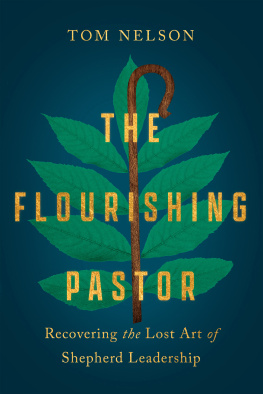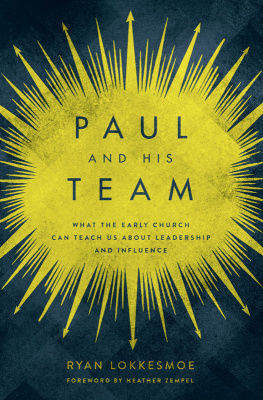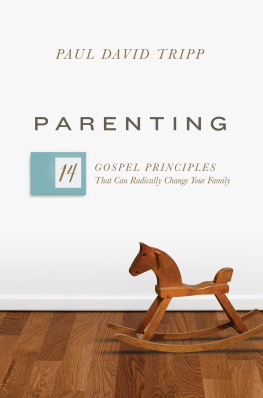Table of Contents
Landmarks
He called me in a bit of a panic because he didnt know who else to call. (He had audited one of my classes.) He was calling because he had found his senior pastor, who was his mentor, in what seemed to be an emotional breakdown. His pastor was irrational, saying things that made no sense. He drove his pastor home, and as the pastor mumbled his way into his house, my former student called and asked me for help. I called his pastor, introduced myself, explained to him why I was calling, and offered my counseling help if it was needed. He thanked me for my concern and told me he had been through a grueling ministry week, hadnt got much sleep, and had had a bit of a physical breakdown. I prayed with him but left the conversation quite concerned and thinking that I would hear from him or someone close to him again.
A few weeks later, I got a phone call from another man I didnt know. He was very upset and said that what he was about to tell me needed immediate action, but it had to be done confidentially. He was reaching out to me after scheduling an appointment with the same senior pastor from a few weeks back. The only time theyd been able to meet was after the senior pastors normal work hours. By the time the man arrived at the pastors office, most of the staff had gone home, and he was let into the building by a janitor. He made his way to the pastors office and knocked on the door, but there was no answer. He hesitated for a moment and then stuck his head in the door opening. He saw the pastor with his head down on the desk and called out to him. Alarmed when he got no response, he went over to shake the pastor to see if he was okay, and the moment he got close, he was hit with the smell of alcohol. He knew right away that his pastor wasnt sick or sleeping; he was drunk.
He ran out of the church building, heart pounding, and called me, because we had developed a bit of a friendship, and he had no idea what to do next. I told him to call the chair of the elder board, which he did. It was like a bomb dropped in the middle of that church. Never had the leadership imagined that such a problem would drop in their lap. Never had they thought that such a thing could be going on in the life of this pastor who was so effective and seemed so committed. Weighty questions swirled around in the minds of the elders about what to do next and what this meant for the life and ministry of the church. And soon it became obvious to me that the developing plan was to set aside the pastor, give him a loving severance, and find a new senior pastor.
Here was a man who had clearly been given ministry, leadership, preaching, and pastoral gifts. Here was a man who had evangelized and discipled many. Here was a preacher-teacher who had given his congregation biblical literacy and theological knowledge, and he was about to be set aside as if he were a commodity, no longer useful and not a dear, God-gifted leader and brother in Christ. The plan seemed more like what an NFL team would do with a weakened player than the actions of a church that believes in the power of rescuing and restoring grace.
I asked if there was any way that I could meet with the elders. My hope was that I could give them an alternative plan. I did my best in the meeting to do two things. First, I preached to these wonderful but scared men of the power and beauty of Gods restorative grace and its promise of fresh starts and new beginnings. And then I laid out a possible restoration plan that included elder and diaconal care, elders wives to care for the fallen pastors wife, babysitters to be on call as needed, addiction counseling, a system of loving accountability, and ongoing support during the restoration process.
It was a long haul and at times ranged from discouraging to seemingly futile, but God was at work in this process. Through the loving ministry of many, he was restoring this man, reclaiming his gifts, and reshaping his trajectory. No promises were made to the pastor of his return to ministryonly promises of continuing support, help, counsel, and encouragement.
I am so thankful to communicate that this man who had fallen so far has returned to ministry. He is the lead pastor of another church, with a vibrant, growing ministry to its surrounding community. God was not done with him, and the church shouldnt have been either. Leader restoration is not a romantic dream of people who dont really understand how deep and serious sin is. Restoration gets at the heart of the gospel that we have given ourselves to. And even if sin necessitates a leaders removal from his position and ministry duties, turning toward him with grace is always right. We sinners dont just need forgiving grace; we need reconciling grace. And we dont just need reconciling grace; we need restoring grace. And we dont just need restoring grace; we need delivering grace. It is beautiful to see the power of restorative grace up close and personal, and it is sad to see that so many leadership communities dont actually trust its power when a key leaders sin has been revealed by the divine restorer.
Everybody Believes in Grace until a Leader Needs It
Every church or ministry leadership community must be a restorative community if its going to have long-term spiritual health and ministry effectiveness. A commitment to the spirit, attitudes, and actions of restoration is vital. As I have written before, there may be nothing more important, humbling, or culture-shaping for a ministry leadership community than to keep in view at all times that every member of the community is in the middle of their own sanctification. No leader is sin free, no leader lives above the great spiritual battle for the focus and rulership of his heart, and no leader has graduated from his need for grace. Every leader fails to live up to Gods standard in word, thought, or action somehow, someway, every day. Every leader still has moments when he thinks things that he should not think, desires what he should not desire, and acts or speaks in ways that are wrong.
No leader is impervious to a moment of pride or a flash of lust. No leader is above irritation, anger, jealousy, or impatience. Every leader struggles at some time with fear of man or pride of accomplishment. Ministry leaders are quite capable of disrespecting staff members or looking at the opposite sex in ways that are wrong. No leader has a perfect marriage or is a perfect parent. No leader has completely pure and unmixed motives. Heres the bottom line: no leader in any ministry community anywhere is done, that is, completely formed into the image of Jesus Christ.
So if it is true that every leader is in the middle of the ongoing work of Gods sanctifying grace, then it is also true that there is still the presence of remaining sin in every leaders heart. And if there is the presence of remaining sin in their hearts, the leaders will fail, sin, and fall. Sometimes anger robs a leader of his effectiveness. Sometimes envy interrupts the kind of relationships every leader needs for his spiritual health and ministry productivity. Sometimes pride of position and accomplishment gets in the way of the servant posture that must be the stance of every ministry leader. Sometimes private sin grows until the leader is addicted and enslaved. Sometimes a leader flags in his personal pursuit of God and presses ahead in a state of spiritual dryness. Sometimes private family dysfunction or marital unfaithfulness exists right alongside a leaders public ministry. All leaders need spiritual care, but some fall and require loving, firm, well-administered restorative grace.
As I travel the world and have sat with ministry leaders from a wide variety of ecclesiastical and cultural backgrounds, I have seen that when it comes to leaders struggle with sin, we tend to make unbiblical assumptions that cause us to be nave and unprepared for battles that we will face in the life and ministry of leaders in our communities. It is not safe to assume that a seminary graduate is spiritually okay. Its not safe to conclude that a very gifted leader is where he needs to be in his relationship with Jesus . Its not necessarily true that a theologically insightful leader is spiritually mature. Ministry effectiveness is not to be confused with cleanness of heart. What you know about the public persona of a leader does not mean you do not need to be concerned about his private life.
















